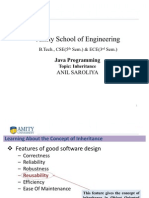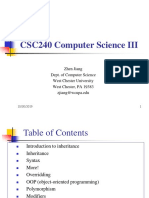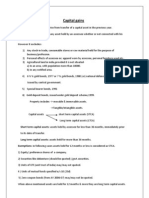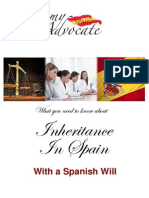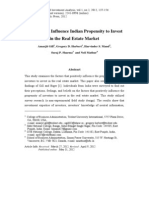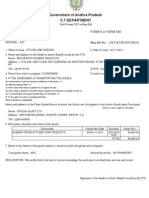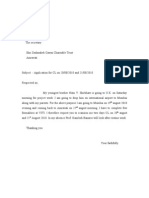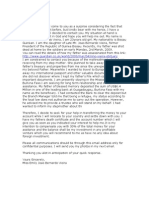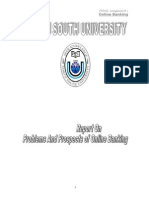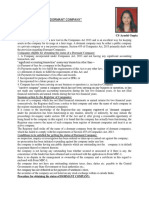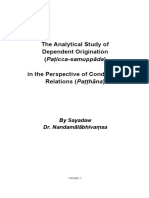From Status To Contract Inheritance and PDF
From Status To Contract Inheritance and PDF
Uploaded by
AvaniJainCopyright:
Available Formats
From Status To Contract Inheritance and PDF
From Status To Contract Inheritance and PDF
Uploaded by
AvaniJainOriginal Title
Copyright
Available Formats
Share this document
Did you find this document useful?
Is this content inappropriate?
Copyright:
Available Formats
From Status To Contract Inheritance and PDF
From Status To Contract Inheritance and PDF
Uploaded by
AvaniJainCopyright:
Available Formats
From Status to Contract:
Inheritance and Succession in
George Eliots Late Fiction
PHOEBE POON
Despite the work of the Law and Literature movement in illuminating
the laws representation in literary texts, it is a truth rarely acknowledged
that the law is often present only in the subtext or margins of fictional
narrative. As William P. MacNeil writes of law in nineteenth-century
literature,
Law, if present at all in any substantive way, is often
figured subtly, even ellipticallyin a range of things: a lost
deed, a long hidden testimonial, an unusual law-hand [as in
the case of Bleak House].1
This article will focus on the legal marginalia that rise to prominence at
certain moments in George Eliots last three novelsthe base fee that
represents the Transomes interest in an estate in Felix Holt, the entail on
Casaubons property that is questioned by Dorothea in Middlemarch, and
the settlement of Sir Hugo Mallingers estates that ensures their future
transmission to his nephew Grandcourt in Daniel Deronda. Through the
realistic portrayal of how settlement, entail, and primogeniture operated
in practice, Eliot transformed the inheritance plot from a well-worn
convention of material reward for heroic conduct into a powerful vehicle
of critique against anachronistic customs of inheritance and succession.
In her later fiction, inheritance is revealed as a point of stress in
relations between the individual and the family, particularly among the
landed classes, for whom land was treated as a patrimony belonging to
1
William P. MacNeil, Novel Judgements: Legal Theory as Fiction (Oxon:
Routledge, 2012), p.15.
50
Sydney Studies
From Status to Contract
the family, rather than to individual members of family. The aristocracy
and (to a lesser extent) the landed gentry preferred the practice of settling
the estate on the eldest son to a more straightforward bequest by will, as
settlement could restrict the rights of the son to alienate part or all of the
land from the patrimony. The holder of settled property therefore was not
so much absolute owner as tenant for life, whose responsibility was to
look after the land and transmit it intact to future generations. As land
law historian A.W.B. Simpson suggests,
although the family was not treated as a legal entity by
the common law, which dealt only in individual property
rights, landed society did nevertheless view property as
ultimately belonging to the family in some moral sense, and
the legal system reflected this.2
Ironically, this regard for land as familial or communally-owned property
made the English landowner appear less the cultured man [who] acts
more as an individual than the peasant, [who acts] more as one of a
group.3 The distinction between communal and individualist mentalities
that Eliot noted in her essay, The Natural History of German Life
(1856), chimed with a post-Enlightenment vision that saw the family,
rather than the individual, as the basic foundation of society. It was a
vision exemplified in Auguste Comtes Course of Positive Philosophy
(1853), in which he asserted that
the family presents the true germ of the various
characteristics of the social organism. Such a conception is
intermediate between the idea of the individual and that of
the species or society.4
This idea of the family as mediator between the individual and
society was also a major theme in Henry Sumner Maines Ancient Law:
Its Connection With the Early History of Society, and Its Relation to
Modern Ideas (1861), a work of jurisprudence which Eliot read from
2
A.W.B. Simpson, A History of the Land Law, 2nd ed. (Oxford: Clarendon Press,
1986), p.209.
3
George Eliot, The Natural History of German Life, Westminster Review 66
(July 1856): 51-79; rpt. in Essays of George Eliot, ed. Thomas Pinney (London:
Routledge and Kegan Paul, 1962), p.274.
4
The Positive Philosophy of Auguste Comte, Vol. 2, trans. Harriet Martineau
(1853; New York: Cosimo, 2009), ch. V, p.502.
51
Sydney Studies
From Status to Contract
November to December 1869 while she was working on Middlemarch.
Within her eight pages of extant notes on Maines legal best-seller,5
Eliot summarised one of Maines most enduring propositions thus:
Society consists of Families, not of individuals.6 The actual statement in
Ancient Lawthe unit of an ancient society was the Family, of a modern
society the Individualbecame the foundation of Maines celebrated
dictum at the end of Chapter 5: [T]he movement of the progressive
societies has hitherto been a movement from Status to Contract.7
Recasting the distinction between ancient and modern conceptions of
society into a theory of social evolution, Maine shifted from sociological
terminology (family/individual) to jurisprudential terminology
(status/contract). Despite his reputation among his contemporaries as a
jurist, he has been reclaimed since the 1980s as a somewhat forgotten
pioneer of the social sciences, particularly sociology and anthropology.
However, as Simon Petch has rightly pointed out, Maines status in
literary studies remains uncertain, as his hypothesis about the
movement from status to contract is often cited, but rarely accorded any
substantial significance.8 This article contends that Maines hypothesis
offers a unique conception of how Victorians viewed their world as a
modern legal culture increasingly defined by contractual relations forged
between autonomous individuals, a culture that developed from ancient
Indo-European societies, where a persons legal status in the family had
determined her rights and duties.
While privileging individualism as the apotheosis of modernity,
Maines status-contract model highlighted the deeply embedded vestiges
of family-oriented custom in Victorian society. Three chapters of Ancient
Law compare customs of inheritance and succession in the ancient and
modern world: Chapters VI, VII, and VIII are titled The Early History of
Testamentary Succession, Ancient and Modern Ideas Respecting Wills
and Successions, and The Early History of Property respectively. In a
passage from Chapter VI, Maine wrote:
5
A. W. B. Simpson, Contract: A Twitching Corpse, Oxford Journal of Legal
Studies 1 (1981): 268.
6
George Eliots Middlemarch Notebooks, eds. John Clark Pratt and Victor A.
Neufeldt (Berkeley, CA: University of California Press, 1979), p.204.
7
Henry Sumner Maine, Ancient Law: Its Connection with the Early History of
Society and its Relation to Modern Ideas, Foreword by Lawrence Rosen (1861;
Tucson: University of Arizona Press, 1986), p.121, 165.
8
Simon Petch, Law, Literature, and Victorian Studies, Victorian Literature and
Culture 35 (2007): 381.
52
Sydney Studies
From Status to Contract
The popular or even the legal conception of a Will [is]
that a Will necessarily takes effect at death only, - that it is
secret, not known as a matter of course to persons taking
interests under its provisions, - that it is revocable, i.e.
always capable of being superseded by a new act of
testation. Yet I shall be able to show that there was a time
when none of these characteristics belonged to a Will.9
Maine subsequently revealed that, for Roman citizens, wills were
irrevocable, public documents that took effect during the life of the
testator. While the ancient Roman will was historically distant from the
settlements and entails depicted in Eliots novels, its characteristics
(entirely opposite to those of the modern will) clearly resembled the
deeds of strict settlement that were used by the aristocracy and landed
gentry to ensure that their estates descended intact to future generations.
Although not in all instances completely irrevocable, a settlement was
strict in the sense that conditions imposed by its original maker (the
settlor) were not easily revoked or modified. They were private family
documents, but the need to break or bar existing entails and resettle
the estate once every generation meant that the current holder of the
estate (the life tenant) had to disclose the legal details to his successor
(the tenant in tail); the contents of a settlement therefore were not
necessarily secret. Finally, settlements did not, in many instances, take
effect at death, as the procedure for barring the entail usually occurred
on one of three occasionssoon after the sons majority, at his marriage,
or at the time that the father made his will.10
The entail was one of two main elements in a deed of settlement, the
second being family provisionprovision for the wife through jointure,
and the younger children through fixed monetary sums or portions. As
property devised to women became their husbands upon their marriage,
the entail enabled landowners to create a fixed order of succession that
9
Maine, Ancient Law, p.169.
The advantage of inter vivos settlement, which took effect while father and son
were still alive, rather than testamentary settlement, which took effect after the
fathers death, was that the father could supervise the succession of his son and
witness the changing-of-the-guard in his lifetime. See John Habakkuk,
Marriage, Debt, and the Estates System: English Landownership 1650-1950
(Oxford: Clarendon Press, 1994), pp.26-9; Barbara English and John Saville,
Strict Settlement: A Guide to Historians (Hull: University of Hull Press, 1983),
pp.32-40.
10
53
Sydney Studies
From Status to Contract
kept the patrimonial estate intact in the male line. However, the
maximum length of an entail was a life or lives in being plus a period
in gross of twenty-one years.11 This meant that land could be tied up for
three generations only, in the typical case a father, his eldest son, and his
(unborn) eldest grandson until he was 21 years of age.12 While
incumbent life tenants could not reduce endless generations of unborn
male descendants to a life tenancy, a chain of resettlements every
generation virtually amounted to the creation of a perpetual entail. For
landlords with dynastic ambitions, the ideal was to keep a succession of
life tenants on the family lands ad infinitum.13 In this manner, their
estates would descend in the family generation after generation with
never an absolute owner in possession, who had the capacity to alienate
all or part of the property from the patrimony.14 Therefore, while the
fundamental principle of land law was tenure, which limited
landownership to an individual lifetime, settlements of landed property
could provide for ownership in perpetuity not by individuals, but by
families.
In every ideal legal situation, there are always loopholes or
exceptions, a rare one of which is detailed in Felix Holt. Before a certain
John Justus Transome in the eighteenth century had the opportunity to
resettle his estate in the manner described above, his prodigal son
Thomas had tried to bar the entail and exchange his future patrimony for
cash:
Thomas proving a prodigal, had, without the
knowledge of his father, the tenant in possession, sold his
own and his descendants rights to a lawyer-cousin named
Durfey; therefore, the title of the Durfey-Transomes, in
spite of that old Durfeys tricks to show the contrary,
depended solely on the purchase of the base fee thus
created by Thomas Transome; and the Bycliffes were the
11
Cadell v. Palmer (1833) 1 Cl and F 372. See A.W.B. Simpson, A History of the
Land Law, 2nd ed. (Oxford: Clarendon Press, 1986), p.226; and J. H. Baker, An
Introduction to English Legal History, 2nd ed. (London: Butterworths, 1979),
p.245.
12
F. M. L. Thompson, English Landed Society in the Nineteenth Century
(London: Routledge and Kegan Paul, 1963), p.64.
13
Simpson, A History of the Land Law, p.236.
14
Eileen Spring, Law, Land and Family: Aristocratic Inheritance in England,
1300 to 1800 (Chapel Hill: University of North Carolina Press, 1993), p.125.
54
Sydney Studies
From Status to Contract
remainder-men who might fairly oust the DurfeyTransomes if ever the issue of the prodigal Thomas went
clean out of existence, and ceased to represent a right which
he had bargained away from them.15
Without his fathers consent, Thomas could only partially bar or cut
off the entail, that is, he could sell his own and his descendants rights
to the Transome estates, but not the rights of non-lineal descendants,
namely the Bycliffes, known as the remainder-men. The resulting legal
interest from a partial barring was a mere base fee, which attracted very
little value on the market because its legal complexities rendered it a
risky security for buyers and creditors. According to legal historian A. W.
B. Simpson, a base fee was an interest in property founded on a
contingency:
The alienee [the purchaser of the fee] will be safe until the
issue of the alienor [the seller] who were capable of
inheriting under the entail die out.16
In the event that the alienors issue does die out, the estate would revert to
the remainder-men named under the original settlement. The alienee and
his descendants could therefore be dispossessed of property that they had
held for generations on the failure of the alienors family line. The family
line might not perish (at least not before the alienees own), or it might
take several generations and upwards from decades, if not centuries, to
perish, but few buyers were willing to gamble their property on the
continuation of a strangers progeny. Thomas Transomes lawyer-cousin
Durfey, however, proves to be an exception, as he acquires the base fee,
and changes his name to Transome in order to trick others into
believing that his title is more secure than it really is.
Featuring one of the most complicated settlements in fiction (or
indeed fact), Felix Holt has attracted criticism from many readers and
critics, who were frustrated by the excessive technicality of the novels
inheritance plot. As F. R. Leavis famously wrote: the
15
George Eliot, Felix Holt, the Radical, ed. Fred C. Thomson (1866; Oxford:
Oxford University Press, 1998), p.239.
16
Simpson, A History of the Land Law, p.91.
55
Sydney Studies
From Status to Contract
esoteric subtleties of the law of entail demand of the
reader a strenuousness of attention that, if he is an admirer of
George Eliot, he is unwilling to devote.17
While the base fee may have been rare in legal practice, its pivotal status
in the plot led G. S. Venables in the Edinburgh Review to the insight that
the law supplies to modern novels the place of that supernatural
machinery which was once thought indispensable in epic composition.18
Venables saw the base fee as a modern deus ex machina, the improbable
contrivance or contingency which hastens the characters to their tragic
ends. The contingency that would deprive the Durfey-Transomes of their
estate is eventually triggered by the death during an election riot of the
last of the original Transomes, a dclass Tommy Trounsem. This event
makes Esther Lyon, who no one knows at first as the daughter of a
Bycliffe, the rightful legal claimant.
Taking into account the literary context of Felix Holt, the effect of
the base fee is comparable with the sudden twists of fate commonly
found in sensation fiction of the 1860s, which had a tendency to wipe out
a number of male issue and open the way for an unlikely candidate to
inherit a landed estate. A realist novel with some notable sensational
narrative elementsworking-class riots, adultery, clandestine affairs
Felix Holt is elevated above the low-brow sensation novel by the
Aristotlean discourse of tragedy in which the Transome story is framed.19
As the narrator writes in the Introduction:
For there is seldom any wrong-doing which does not carry
along with it some downfall of blindly-climbing hopes, some
hard entail of suffering, some quickly-satiated desire that
survives, with the life in death of old paralytic vice, to see
itself cursed by its woeful progenysome tragic mark of
kinship in the one brief life to the far-stretching life that
17
F. R. Leavis, The Great Tradition (1948; rpt. Harmondsworth: Penguin, 1962),
p.63.
18
[G. S. Venables], Review of Felix Holt, Edinburgh Review 124 (Oct. 1866):
435-49; rpt. in George Eliot: The Critical Heritage, ed. David Carroll (London:
Routledge and Kegan Paul, 1971), p.280.
19
Eliots diary entry on 15 June 1865 indicates that she read again Aristotles
Poetics, with fresh admiration. See The Journals of George Eliot, ed. Margaret
Harris and Judith Johnston (Cambridge: Cambridge University Press, 1998),
p.124.
56
Sydney Studies
From Status to Contract
went before, and to the life that is to come after, such as has
raised the pity and terror of men ever since they began to
discern between will and destiny.20
This passage blends the language of inheritance with the language of
tragedy. The hard entail of suffering, for example, is charged with both
moral and legal connotations, meanings for the present and future. The
phrase points to the sorrows of Mrs Transome which unfold from Chapter
1 onwards, and entail suggests that her present woes are the tragic
consequences of a guilty past, namely her secret adultery with the lawyer
Matthew Jermyn, which resulted in the birth of an illegitimate son,
Harold. However, entail also points prophetically to the ill-fated
entailing of the Transome estates that comes to light belatedly in
Chapter 29. In legal terms, entail signifies the pursuit of unbroken
patrilineage, the attempt to transmit property along an indefinite line of
male successors.
Felix Holt is a story of broken transmission that suggests the futility
of striving for a perpetual entail, and critiques the aristocratic attitude,
adopted by decaying gentry like the Transomes, of applying customary
primogeniture, without questioning its efficacy for family or society.
Eliots diaries indicate that she read John Stuart Mills Principles of
Political Economy (1848) and Henry Fawcetts The Economic Position of
the British Labourer (1865).21 In the former book, Mill argued that
inheritance represented a duty of parents to their children, but stressed
that
the good not only of society but of the individuals would be
better consulted by bequeathing to them a moderate, [rather]
than a large provision.
Primogeniture ensured not only inequitable division of property, but also
that the eldest child, who inherited significantly more than his siblings,
was likely to rely solely on his inheritance instead of achieving by [his]
20
Eliot, Felix Holt, p.11.
Eliots journals indicate that she read Mills book for a second time from May
28 to July 12, 1865. She also claimed to have been reading Fawcetts Economic
condition of the Working Classes [sic] and Mills [On] Liberty in a diary entry
on November 15, 1865. Felix Holt was written between April 29, 1865 and May
31, 1866. See The Journals of George Eliot, ed. Margaret Harris and Judith
Johnston (Cambridge: Cambridge University Press, 1998), pp.124-6.
21
57
Sydney Studies
From Status to Contract
own exertions a successful life.22 The imbecility of Harolds father and
the dissolute life of his older brother support Mills theory that
primogeniture turns eldest sons and heirs into weaklings or idle
spendthrifts. Focusing on the Transomes domestic life, Felix Holt is less
attentive than Mill and Fawcett to the wider economic and social
consequences of settlement and entailment, but its depiction of Transome
Courts falling into a state of disrepair and stagnancy reflected actual
conditions that land reformers like Fawcett blamed on the overconcentration of landownership in the hands of an elite, who had few
incentives to expend capital on improving drainage and agricultural
productivity in view of such expenditure enriching the eldest son at the
expense of younger children whose provision needed to be raised by
mortgages on the estate.23 The critique that Eliots novel advanced
against customs of settlement, entail and primogeniture was situated
therefore in contemporary debates about what economic policies would
best promote sustainable and productive land practices that benefit wider
society, rather than a small group of landowners.
According to land historians, the debates which came to be known as
the Land Question were particularly important at two points during the
nineteenth century: during the 1840s and from the 1870s onwards.24
Both periods of agitation followed the passage of the First and Second
Reform Bills, and therefore may signify post-Reform rumblings.
Although agitation was not as heated in the 1860s as it became during the
agricultural depression of the 1870s, the Land Question remained a
subject of intermittent interest, as demonstrated by Eliots reading of
Fawcetts book, one among a series of influential publications released by
the Cobden Club, which sought to revive interest in land reform
following Anti-Corn Law leader Richard Cobdens advocacy in 1864 for
the creation of a League for free trade in Land.25 The catch-phrase, free
trade in land, became synonymous with calls among liberal and more
radical reformers for the state to intervene to prevent landowners from
22
Mill, Principles of Political Economy, ed. J. M. Robson (1848; rpt. Toronto:
University of Toronto Press, 1965), bk. II, ch. ii, s. 3, p.221.
23
Henry Fawcett, The Economic Position of the British Labourer (Cambridge and
London: Macmillan Press, 1865), p.21.
24
Matthew Cragoe and Paul Readman, Introduction, The Land Question in
Britain, 1750-1950, ed. Matthew Cragoe and Paul Readman (Basingstoke:
Palgrave Macmillan, 2010), p.3.
25
Anthony Howe, The Manchester School and the Landlords: The Failure of
Land Reform in Early Victorian Britain, The Land Question in Britain, p.87.
58
Sydney Studies
From Status to Contract
using strict settlement to keep their properties out of the free market
indefinitely.
Appearing at the cusp of major agitation opposing the rights of
landowners to continue transmitting their estates to eldest sons ad
infinitum, the entail on the Transome estate is not only a contrivance that
precipitates tragedy, but also a signifier of exclusive status, a symbol not
of social progressivism, but of regression. The linking of Maine to the
cause of land-law reform was first made in an article for the Westminster
Review in July 1864.26 Reviewing Mill's Principles of Political Economy
with Francis Newmans Lectures on Political Economy (1851), Herbert
Spencers Social Statics (1851), and Maines Ancient Law (1861), the
article connected four texts which had developed historicised theories of
social organisation. Maines status-contract theory was used to support
the contention that the tenure of land should be grounded in relations
of men to the State, rather than in familial or tribal models of descent.27
That contract had not taken over from status was indicated by the results
of the 1861 census, which showed that, of the total British population of
roughly 20 million, the whole number of landed proprietors [was] stated
at only 30,766.28 In June 1866, T. E. Cliffe-Leslie conscripted Maines
ideas more explicitly by opening his article in the Fortnightly Review
with a quotation from Ancient Law: The society of our day is mainly
distinguished from that of preceding generations by the largeness of the
sphere which is occupied in it by contract.29 He then remarked upon the
tendency that the jurisprudence of our Courts and of the direct legislation
of Parliament has been steadily in the opposite direction to that described
by Mr. Maine.30 Both articles typified a trend of applying Maines
historical observations to contemporary political affairs that continued
into the 1870s, provoking him to defend the right of private property in
his 1875 Rede Lecture.31 As a staunch liberal-conservative, Maine neither
26
The Tenure of Land, Westminster Review 82 o.s, 26 n.s. (July 1864): 105-37.
The Tenure of Land, p.116.
28
The Tenure of Land, p.123.
29
T. E. Cliffe-Leslie, Political economy and the tenure of land, Fortnightly
Review 5 (June 1, 1866): 220, quoting from Maine, Ancient Law, p.295.
30
Cliffe-Leslie, Political economy and the tenure of land, p.220.
31
Nobody is at liberty to attack several property [i.e. individual or private
property] and to say at the same time that he valued civilisation. Henry Sumner
Maine, The Effects of Observation of India on Modern European Thought, Rede
Lecture 1875, delivered before the University of Cambridge, rpt. in Village
Communities in East and West, 4th ed. (London: Murray, 1881), p.230.
27
59
Sydney Studies
From Status to Contract
sought nor desired the appropriation of his ideas for perceived socialistic
purposes, and he rejected claims by the Daily News and the Examiner that
he was a prophet of agrarian radicalism as quite groundless.32
The linking of Eliot to the Land Question was less overt, as lawyers
and legal historians read the novels purpose as illustrative of how entails
and base fees operated in practice. Among the legal practitioners who
admired Felix Holt were Frederic Harrison, who famously assisted Eliot
with drafting the legal plot,33 and Frederick Pollock (incidentally a great
admirer of Maine), who praised Eliot for using the base fee
with great effect and with perfect correctness, as part of the
machinery of the plot; insomuch that conveyancers reading
the novel have been known to lament seriously, as if the
thing had happened to one of their own clients, that the
parties did not take better advice.34
Modern legal historians have also admired Eliots accurate deployment of
the law of entail. Eileen Spring has suggested that George Eliot had
woven a good story around the base fee.35 While lawyers have regarded
the novels legal plot more highly than literary critics, their tendency to
limit the novel to an empirical portrait of law-in-action neglected the
wider political significance of the Transome entail, which appeared in a
period in which the practices of primogeniture, entails, and strict
settlements were under increasing scrutiny.
More importantly, they neglected the aesthetic realism of a legal
plot that generates sympathy with as much as criticism of the declining
32
Letter from Maine to John Murray, 12 April 1871, John Murray Archives, qtd.
by George Feaver, From Status to Contract: A Biography of Sir Henry Maine
1822-1888 (London and Harlow: Longmans, Green and Co., 1969), p.120.
33
Eliots extensive consultation with Harrison can be traced in her letters from
January 1866 to June 1866 when she completed the novel. See The George Eliot
Letters, vol. 4, ed. Gordon S. Haight (London: Oxford University Press, 1956),
pp.214-65. Critical commentary on their correspondence is found in Fred C.
Thomson, The Legal Plot in Felix Holt, Studies in English Literature, 15001900 7.4 (1967): 691-704.
34
Frederick Pollock, The Land Laws, 2nd ed. (1883; rpt. London: Macmillan,
1887), p.110.
35
Spring, Law, Land and Family, p.126. See also: See W. R. Cornish and G. de
N. Clark, Law and Society in England, 1750-1950 (London: Sweet and Maxwell,
1989), p.125.
60
Sydney Studies
From Status to Contract
gentry class to which the Transomes belong. By weaving the base fee into
her narrative so that it appears a part of the natural history of the landed
classes, Eliot seems to advocate the notion that Art, being the nearest
thing to life and a mode of amplifying experience and extending our
contact with our fellow-men beyond the bounds of our personal lot,
should direct the readers sympathy to extend in all directions, with the
English gentry as well as the peasant or artisan (whose interests were
represented in her essay, The Natural History of German Life), or the
industrialised working class (whose interests are depicted in Felix Holt as
in conflict with those of the gentry). Workers appear more as a
background to the central events which shape the Transome tragedy.
With the exception of a charismatic, anonymous spokesman for workingclass rights in Chapter 30, there are few individualised working-class
characters in the novel, which features the climax of a rioting mass of
workers, representing the kind of revolutionary anarchy both feared and
deplored by Victorian middle-class intellectuals. That Eliot seems
somewhat out of her element when she portrays workers suggests that
Felix Holt focuses less on Reform Bill discourses of universal suffrage,
citizenship and representative government than on Land Question
discourses of the responsibility of the landed classes, community and
social stability.
However, Felix Holt does more than simply dramatise problems that
confronted the landed gentry, who are partly responsible for their own
decline by pandering to anachronistic customs of succession. The novel
also adds another dimension to the land law debates by making Esther
Lyon, the adopted daughter of a Dissenting minister, the unexpected but
rightful legal claimant of Transome Court. Grounded in arguments for
more equitable distribution of land, the Land Question gave little
attention to primogeniture, entails, and strict settlements as instruments
for facilitating and legitimating patriarchy. In contrast to marriage and
divorce lawswhich were more explicitly campaigned against for
maintaining a sexual double standard that marginalised womenthe
primary objections to the land laws were oriented to interests of class, not
gender.36 The curious phenomenon in Felix Holt and Eliots later novels
36
The gendered nature of the modern history of land law is a theme throughout
Springs feminist-oriented study, Law, Land, and Family. While this article
focuses on the issue of inheritance, there is extensive critical commentary on the
agitation of Victorian marriage and divorce law. See, for example, Barbara
Leckie, Culture and Adultery: The Novel, the Newspaper, and the Law, 18561914 (Philadelphia: University of Pennsylvania Press, 1999); Mary Lyndon
61
Sydney Studies
From Status to Contract
whereby property winds its way circuitously but inevitably to women
(irrespective of family preference and customary practice) turned readers
attention to gender, rather than class inequality.
Esthers legal claim reveals that social reality may be the reverse of
legal assumption. According to Maine, the custom of Agnatic descent,
which traced genealogy exclusively through males, was the basis for a
memorable legal maxim:
Mulier est finis familiaea woman is the terminus of the
family. A female name closes the branch or twig of the
genealogy in which it occurs. None of the descendants of a
female are included in the primitive notion of family
relationship.37
Contrary to this maxim and common perception, property in Eliots
novels tends to fall eventually to women, rather than men, a pattern seen
in Felix Holt that is also repeated in Middlemarch and Daniel Deronda,
where Dorothea Brooke and Gwendolen Harleth become heiresses to
property that they subsequently reject. Whereas Maine presents
patriarchal authority in the ancient world as the precedent for patriarchal
inheritance practices in the nineteenth century, Eliot interrogated the
politics of male succession, which concealed the necessity of female
succession at crucial times to ensure familial survival.
Moving from the unprivileged status of a ministers daughter to the
privileged one of heiress, Esther may appear to exemplify a Mainian rise
from status to contract. Her immediate trajectory, however, is simply to
move from one status to another. Her choices are still limited to marriage
and inheritance: which man to marryHarold or Felix; and whether or
not to accept the estate. Furthermore, she occupies the unusual legal
status of remainder-man, a suggestive term for heir of last resort
which raises for Harold the whimsical image of a mendicant sailor with
a wooden leg.38 As Neil Hertz suggests, the irony inherent in the legal
parlance is that a remainder-man may be the remains of a man both
Shanley, Feminism, Marriage, and the Law in Victorian England (Princeton:
Princeton UP, 1989); and Lee Holcombe, Wives and Property: Reform of the
Married Womens Property Law in Nineteenth-Century England (Toronto:
University of Toronto Press, 1983).
37
Maine, Ancient Law, p.143.
38
Eliot, Felix Holt, p.285.
62
Sydney Studies
From Status to Contract
dclass and dismembered.39 While Esther possesses none of the features
that might be associated with vestigial humanity, her position is uniquely
that of quasi-heiress, whose succession is more a strange, legal anomaly
than a natural passage to inheritance.40 Yet the survival and preservation
of three patrilinesthe Durfey, the Transome, and the Bycliffeseem to
depend on Esther.
Instead of remaining at a genealogical terminus, Esther finds an
escape from an identity forged around the elevated status of heiress by
drawing upon the dual education she receives from her father Rufus Lyon
and self-appointed tutor Felix Holt. Their respective spiritual and secular
guidance offer alternative principles to property by which to define her
identity. Neither provides flawless guidance. Esther learns to appreciate
the truth of Felixs lesson (designed to turn her from idle fancy and
selfish inclination) that her fathers principles are greater and worthier
than what guides [her] life.41 Yet, Lyons theory of providential
arrangement provides no illumination for Esther on the question of
whether to accept the Transome estate.42 Felixs secular philosophy is
also problematic, as, although he preaches renunciation as a natural
course for those (like himself) who do not consider wealth as any
peculiar virtue, he does not realise that renouncing his love for Esther
will prove more difficult than renouncing material goods. By marrying
Esther in the end, he compromises his ideal of celibacy, and learns to
strike a balance between worthy and needless sacrifice.
The fallibility of both religious and secular belief systems leads
Esther to the realisation that she must forge her own principles. Finding
her own alternative to complete renunciation, she leaves Transome Court
and refuses the bulk of her inheritance, but marries Felix, claiming for
herself and her husband only two pounds a week, plus a little income
for Felixs mother, enough for her to live as she had been used to live,
and a similar income for her father, to save him from being dependent
39
Neil Hertz, George Eliots Pulse (Stanford: Stanford University Press, 2003),
p.89.
40
According to J. H. Baker, historically, a remainder-man took by a form of
succession unknown to the law; he had no prior seisin, he was no ones heir, and
it was not clear what remedy he had to recover his interest. Thus he was regarded
by 13th-century legal writer Henry de Bracton as a kind of quasi-heir. J. H.
Baker, An Introduction to English Legal History, p.233.
41
Eliot, Felix Holt, p.104.
42
Eliot, Felix Holt, p.326.
63
Sydney Studies
From Status to Contract
when he is no longer able to preach (396). The course she chooses
allows her to fulfil her duties to family, but also to avoid the constraints
on self-determination imposed by her legal status. Esther therefore
accepts a qualified independence or individualism, not the full severance
from family bonds and commitments that Maine regarded as indicative of
contractual freedom and individual autonomy.
It appears at the conclusion of the novel that the reader is left in the
double bind that characterises Victorian endings for its feminine
characters, for whom there is no readier conduit for directing [their]
desire [to do something important] than through marriage with already
focused and determined men.43 The radicalism of Felix Holt, however, is
that it depicts a woman rejecting the bulk of property to which she is
entitled, accepting only the small amount needed to care for family. The
striking of a balance between individual and family welfare is the
measure of truly ethical behaviour in Eliots late fiction. Although
generally given lowest priority in the order of succession, daughters,
rather than fathers and sons, are the ones who prove their worth by
embracing an alternative to the status economy, in which landed
inheritance is the basis of wealth, power, and social position.
Middlemarch
Although less fixated on legal technicalities than Felix Holt,
Middlemarch features not just one, but three main inheritance plots. The
detailed legal briefs laying out the whole history of the Transome
settlement are replaced by Dorotheas ethical question in Chapter 37
Was inheritance a question of liking or of responsibility?which
occurs while she ponders the disinheritance of Casaubons Aunt Julia
(the grandmother of Will Ladislaw), only because she had chosen [to
marry] a man who was poor:
Dorothea had wrought herself into some independent
clearness as to the historical, political reasons why eldest
sons had superior rights, and why land should be entailed:
those reasons, impressing her with a certain awe, might be
weightier than she knew, but here was a question of ties
43
Cathrine O. Frank, Law, Literature, and the Transmission of Culture in
England, 1837-1925 (Surrey: Ashgate, 2010), p.127.
64
Sydney Studies
From Status to Contract
which left them uninfringed. Here was a daughter [Julia]
whose childeven according to the ordinary aping of
aristocratic institutions by people who are no more
aristocratic than retired grocers, and who have no more land
to keep together than a lawn and a paddockwould have a
prior claim. Was inheritance a question of liking or of
responsibility? All the energy of Dorotheas nature went on
the side of responsibilitythe fulfilment of claims founded
on our own deeds, such as marriage and parentage.44
Dorotheas weighing up of individual liking and familial
responsibility seems to be an attempt to determine whether status or
contract ought to prevail. On one hand, her belief that the fulfilment of
claims should be founded on marriage and parentage suggests her
preference for a status-based view of inheritance that privileges the
claims of legal ties and biological kinship. On the other hand, the claim of
Aunt Julia that Dorothea believes ought to have been fulfilled is founded
on personal deeds, and therefore, decisions about inheritance should rest
on integrity of character, rather than on concerns about decline in class
status, resulting from a socially disadvantageous marriage. Like Esther
Lyon, Dorotheas ethical judgement seems to be suspended between
status and contract.
Dorotheas interrogation of primogeniture is commensurate with her
passion for land reform, which is evident from the beginning of the novel
in her impatience of her uncles talk or his way of letting things be on
his estate and her longing for the time when she would be of age and
have some command of money for generous schemes.45 Her sympathy
with impoverished tenants echoes the sentiments of reformers, like Henry
Fawcett, who drew attention to the plight of tenants and labourers. I
think we deserve to be beaten out of our beautiful houses with a scourge
of small cordsall of us who let tenants live in such sties as we see
round us, she says to James Chettam, the baronet who courts her. The
inconsistency in Dorotheas character, however, is suggested by her
decision not to marry Chettam, who shows a willingness to indulge her
passion for land reform, but Casaubon, a scholar and clergyman who does
not care about building cottages for the poor or about the philanthropic
side of things.46
44
Eliot, Middlemarch, p.333.
Eliot, Middlemarch, p.8.
46
Eliot, Middlemarch, pp.30, 48.
45
65
Sydney Studies
From Status to Contract
Dorothea also misjudges Casaubons sense of right,47 which she
thinks would make him amenable to changing his will in favour of his
cousin Ladislaw, whose grandmothers disinheritance keeps him poor.
Instead of agreeing with her concerns for Ladislaw, Casaubons power
of suspicious construction is agitated into exasperated activity, as he
imagines his cousin making an easy conquest and entering into [his]
nest by marrying Dorothea after his death.48 His last will and testament
reflects his jealousy, as it bequeaths not only the fruitless task of
completing his lifes work, the Key to all Mythologies, but also contains
a codicil that gives all his property to Dorothea on condition that she does
not marry Ladislaw. Thus he take advantage of Dorotheas dutiful nature
towards him and his work, and, as James Chettam observes, most
unfairly compromise[s] her by provoking rumours of an affair between
her and Will, and exploiting provincial gossip and public scandal to
prevent their marriage.49 Casaubons will exemplifies the power of the
dead hand (the title of Book V), an instrument used both to defend his
status and reputation as husband, and to assert his control over the living
from beyond the grave by putting them under contractual obligation to
his testamentary desires.
The abuse of testamentary power is demonstrated not only by
Casaubon but also by the wealthy Peter Featherstone, who enjoys
tormenting his siblings and nephew Fred Vincy by making tantalising
references to the unlikelihood of their receiving anything in his will.
However, unlike Casaubon, whose dead hand is not rendered powerless
until the end of the novel, Featherstones impotence over his family is
literally and symbolically represented immediately upon his decease:
Peter Featherstone was dead, with his right hand clasping the
keys [to the iron chest containing his wills], and his left hand
lying on the heap of notes and gold.50
Mary Garths refusal to accede to Featherstones request for her to burn
one of his wills results in her friend Fred Vincy losing a ten-thousandpound bequest, and the disappointment of a testator, whose power to
control the destiny of his property is removed when he cannot prevail
upon his carer to carry out his intentions. Featherstones posthumous
47
Eliot, Middlemarch, p. 334.
Eliot, Middlemarch, p.375.
49
Eliot, Middlemarch, p.434.
50
Eliot, Middlemarch, p.285.
48
66
Sydney Studies
From Status to Contract
authority over his affairs is dealt a further blow later in the novel when
his illegitimate son and heir Joshua Rigg sells his fathers property, Stone
Court, to Nicholas Bulstrode, a banker he despises. In labyrinthine
fashion, however, Featherstones property eventually makes its way to
Fred, who becomes manager of Stone Court through an unusual act of
kindness by Bulstrode.
Although not introduced until Book VI, the novels third inheritance
plot provides for the resolution of the first two plots. Whereas Casaubon
attempts to deny Will the inheritance of his paternal grandmother Julia,
Bulstrode is responsible for denying him the inheritance of his maternal
grandmother Mrs Dunkirk, whom he deceived by keeping secret the
whereabouts of her run-away daughter Sarah. The deception allowed
Bulstrode to inherit the widowed Mrs Dunkirks fortune when they
married, as the latter was prevented from benefiting the grandchild she
never knew she had. However, after his purchase of Stone Court from
Joshua Rigg, the past threatens to engulf him, as Raffles, the
unscrupulous spy who was hired to find Sarah, reappears to demand
money as the price of secrecy. Casaubon refuses to recognise Wills
claim and in fact hinders it by a testamentary clause, but in order to save
his reputation, Bulstrode admits: you have a claim on me, Mr Ladislaw:
as I said before, not a legal claim, but one which my conscience
recognises.51 His offer to Will of a five hundred pound annuity during
his life and a proportional capital at his death arrives hot on the heels of
Raffles queries about his mother, and it is rejected on the same basis that
his mother had run away to avoid enjoying any part of the profits which
her fathers pawnbroking business made out of lost souls.52 My
unblemished honour is important to me, he tells Bulstrode.
It is important to me to have no stain on my birth and
connections. And now I find there is a stain which I cant
help. My mother felt it, and tried to keep as clear of it as she
could, and so will I.53
By rejecting an income from Bulstrode, Will becomes the representative
of three successive generations of disinheritance.54
51
Eliot, Middlemarch, p.557.
Eliot, Middlemarch, p.551.
53
Eliot, Middlemarch, p.559.
54
Henry Staten, Is Middlemarch Ahistorical? PMLA 115 (2000): 1003.
52
67
Sydney Studies
From Status to Contract
Wills renunciation of wealth prepares the reader for Dorotheas even
more momentous renunciation of her husbands money. The sudden onset
of a thunderstorm creates an apocalyptic setting for the two lovers to
acknowledge to each other for the first time the forces which divide them.
The image of Dorothea and Will,
their hands clasped, like two children, looking out on the
storm, while the thunder gave a tremendous crack and roll
above them, and the rain began to pour down,55
evokes the last scene of The Mill on the Floss, where the siblings Tom
and Maggie Tulliver are joined together before the river sweeps them to
their deaths. Similar apocalyptic language is noticeable in the scene of
Derondas parting from Gwendolen in George Eliot's last novel, Daniel
Deronda. Whereas Gwendolens liberation from an egotistical worldview coincides with her parting from Deronda, Dorotheas soul is
liberated from its terrible conflict before her meeting with Will, which
opens as a scene of parting but ends as a scene of reunion (704).
Dorotheas act of renouncing Casaubons money takes place during an
uncharacteristic outburst, in which the emotions repressed to silence
while she was married to Casaubon and by his will, are finally let out:
Oh, I cannot bear itmy heart will break, said Dorothea,
starting from her seat, the flood of her young passion bearing
down all the obstructions which had kept her silentthe great
tears rising and falling in an instant: I dont mind about
povertyI hate my wealth.56
Instead of freeing Will from the poverty which was his portion from his
female forebears, Dorothea joins his grandmother Julias and mother
Sarahs legacy of marital recklessness by marrying Ladislaw outside
legal, domestic and social propriety. Despite the adverse effect of her
decision to her economic circumstances, particularly from her familys
perspective, Dorothea condemns herself only to genteel povertyshe still
has her own income of seven hundred a yearwhile she gains the man
she loves and a happy home life. Her marriage to Casaubon had been
sterile, and it seemed as though her sister Celia, who had married James
Chettam and given birth to a baby son, would become the mother of the
55
56
Eliot, Middlemarch, p.724.
Eliot, Middlemarch, p.725.
68
Sydney Studies
From Status to Contract
heir to the Brooke familys estate. With Ladislaw, Dorothea has a son of
her own.
Before the novel concludes, it returns briefly to the problem of the
entail, as Mr Brooke suggests half-heartedly to Chettam that he could cut
off the entail as a sign of disapproval of Dorotheas second marriage.
Although hostile to Ladislaw and realising that Brookes proposal would
unite Tipton Grange and his own estate (a prospect that flattered him for
his son and heir), Chettams honour prevents him from encouraging
Brooke to take such drastic action as disinheriting Dorotheas son.57
(730). The decision of Chettam and Brooke not to take punitive action
against Dorothea for the mere sake of propriety ends a family history of
disinheritances. The withholding or conferring of inheritances on the
basis of individual liking is finally replaced by the choosing of an heir
on the basis of family responsibility.
Daniel Deronda
Whereas Felix Holt and Middlemarch explore questions of inheritance
and succession as they present themselves in English law, Eliots last
novel considers alternative principles of inheritance in Jewish law and
culture. The one major difference between English and Jewish law was
that the latter allowed inheritance through the maternal line. Daniel
Deronda is adopted by Sir Hugo Mallinger, but the money for his
education and upbringing derives from his grandfathers fortune, which is
transmitted to him through his mother Leonora Charisi. As in Eliots
earlier fiction, matrilineal inheritance is as much a feature of the narrative
as patrilineal. However, it is important to recognise that Eliot does not
present the Jewish conception of inheritance as ideal in comparison with
the English. The dominance of patriarchy is as entrenched in Hebrew as
in Gentile tradition. Only a young male Jew, intellectually cultured,
morally fervid can qualify as the ideal type to whom Mordecai yearns to
transplant his spiritual life.58 Derondas grandfather, a strict orthodox
Jew, cared for his daughter Leonora only as a makeshift link between
himself and an unborn grandson to whom he hoped to transmit his
spiritual legacy.59
57
Eliot, Middlemarch, p.730.
Eliot, Daniel Deronda, ed. Terence Cave (1876; rpt. London: Penguin, 1995),
p.472.
59
Eliot, Daniel Deronda, 631.
58
69
Sydney Studies
From Status to Contract
Derondas final parting from Gwendolen suggests that the novel does
not ultimately provide for an ideal union between English and Jewish
cultures. Eliot appears to have wanted her story to be something new,
rather than merely another installment of the same old thing, the English
novel of marriage and inheritance.60 As in Felix Holt, she consulted
Frederic Harrison for advice about the law of settlement while writing
Daniel Deronda. Her letters to Harrison suggest that she may have
considered legitimisation by act of Parliament as a course by which
Deronda, who is suspected of being Sir Hugo Mallingers illegitimate
son, could succeed to the Mallinger estates, and perhaps also a peerage.61
Eliots departure from this early plan by giving Deronda a Jewish
parentage ensured that he is not set up simply as a rival to Grandcourts
heirship (as Esther was to Harold in Felix Holt, or Ladislaw to Casaubon
in Middlemarch), but that his future would lie beyond the materialism of
landed estates, and even beyond English shores.
Derondas departure from the conventional English inheritance plot,
however, does not free him completely from the burden of being perhaps
the last surviving male of several Jewish families. The failure of the male
line is a very real prospect for the English Mallingers, whose estates have
run together into the single heirship of a mealy-complexioned male,
Henleigh Mallinger Grandcourt.62 But like their English counterparts,
Derondas ancestors have also struggled to perpetuate the patriline. At
Genoa, his mother tells him that his real name is Daniel Charisi. Before
his adoption by Sir Hugo, she changed his name to Deronda, a branch
of the family which her father had lost sight of.63 The Charisi, Deronda
tells Mordecai, were a strain that has ardently maintained the fellowship
of our racea line of Spanish Jews that has borne many students and
men of practical power.64 In his second interview with his mother, he
learns that his maternal grandmother was a Morteira,65 a family of
Portuguese Jews of Sephardic (Iberian) origin, who were regarded as a
60
Catherine Gallagher, The Body Economic: Life, Death, and Sensation in
Political Economy and the Victorian Novel (Princeton: Princeton University
Press, 2006), p.130.
61
See Eliots letters to Harrison on 30 Dec. 1874, and 1 Jan. 1875, The George
Eliot Letters, vol. 6, pp.100 and 105.
62
Eliot, Daniel Deronda, p.442.
63
Eliot, Daniel Deronda, p.637.
64
Eliot, Daniel Deronda, p.748.
65
Eliot, Daniel Deronda, p.660.
70
Sydney Studies
From Status to Contract
kind of aristocratic stock.66 Despite the aristocratic blood from both
maternal and paternal sides of his family, Deronda is not very dissimilar
to Grandcourt, as he may be the terminus of two, possibly even three,
Jewish patrilinesthe Charisi, the Morteira, and the Deronda.
Instead of attempting to deny his Jewish heritage, Deronda seeks to
confirm his status and racial identity, without allowing it to burden him as
it burdened his mother. For a lengthy period of the novel, his status is an
imposition on his freedom, as he feels that Mordecais will for him to be
his spiritual heir is as constrictive as the grasp of [a] dying hand.67
Known by his friends as virtually incapable of withholding his sympathy
from anyone, Derondas wide-ranging sympathy is tested to its limits by
Mordecais will for him to become not simply an amanuensis for
transcribing a spiritual vision, but to identify with Mordecai completely.
Mordecai insists that Deronda be not only a hand to [him], but a soul,
believing my belief seeing the vision I point tobeholding a glory
where I behold it!68 He desires the preservation of his consumptive,
dying self and the transmission of his ideals to a more beautiful
stronger executive self, and expects Deronda to fulfil his Cabbalistic
desire for a union between their two souls.69
You will be my life: it will be planted afresh; it will
grow. You shall take the inheritance; it has been gathering
for ages you will take the sacred inheritance of the Jew.70
This is a far more radical form of succession than is provided for under
any settlement, will, or entail in English law.
Like Esther and Dorothea in Eliots earlier novels, Deronda finds a
way of reconciling himself with his inheritance, without allowing his
newfound status as a Jew to determine his life completely. After his
mother confirms his Jewish blood, he travels to Mainz to collect a chest
that his grandfather had left in trust for him. But when the trustee of the
chest, Joseph Kalonymos, asks him whether he will call himself a Jew
and profess the faith of [his] fathers, Deronda resists unqualified
66
Terence Cave, Notes to Daniel Deronda, by George Eliot (London: Penguin,
1995), p.842.
67
Eliot, Daniel Deronda, p.564.
68
Eliot, Daniel Deronda, p.499.
69
Eliot, Daniel Deronda, p.473.
70
Eliot, Daniel Deronda, p.500.
71
Sydney Studies
From Status to Contract
commitment to the nationalistic aims which Mordecai and Kalonymos
wish him to fulfil, as he says:
I shall call myself a Jew. But I will not say that I shall
profess to believe exactly as my fathers have believed. Our
fathers themselves changed the horizon of their belief and
learned of other races. But I think I can maintain my
grandfathers notion of separateness with communication. I
hold that my first duty is toward my own people, and if there
is anything to be done towards restoring or perfecting their
common life, I shall make that my vocation.71
Deronda is perhaps too aware of the dangers of cultural insularity, which
turned his mother against her racial and spiritual heritage, and therefore
at no point, crucially, does [he] explicitly embrace
Mordecais conception of guaranteed cultural transmission,
or his vision of an ignited race consciousness that will
automatically enact Israels destiny.72
Deronda also suggests that separateness with communication or
dialogical interaction between Jewish and other races is the path forward.
Derondas Jewish inheritance offers him a way out of the conventional
marriage and inheritance plot, but he must negotiate the extent to which
he allows his Jewish inheritance to determine his actions. To turn the
dead hand of the past into a living and worthwhile vocation, he reserves
for himself the contractual freedom to support the Zionist cause on his
own terms, a freedom he otherwise would be denied if he submitted
completely to the wishes of Mordecai.
Derondas unique journey is depicted alongside the more
conventional marriage and inheritance plot in which Gwendolen Harleth
is entangled. Whereas Deronda struggles at first with his new Jewish
status, Gwendolen Harleth struggles under her husband Grandcourts
despotic authority. Grandcourt, whose importance as a subject of this
realm was of the grandly passive kind which consists in the inheritance of
land,73 is entirely a creature of status, which he owes to his uncle Sir
71
Eliot, Daniel Deronda, p.725.
Amanda Anderson, The Powers of Distance: Cosmopolitanism and the
Cultivation of Detachment (Princeton: Princeton University Press, 2001), p.135.
73
Eliot, Daniel Deronda, p.584.
72
72
Sydney Studies
From Status to Contract
Hugo Mallingers misfortune of failing to father a son. Like Transome
Court in Felix Holt and Tipton Grange in Middlemarch, the estates of the
aristocratic Mallingers in Daniel Deronda are entailed strictly to males as
a consequence of an ill-devised settlement which [Sir Hugos] father, Sir
Francis, had chosen to make by will.74 Sir Hugo is the life tenant of three
estatesthe oldest, Kings Topping, granted to a certain Hugues le
Malingre, who came in with the Conqueror, Monks Topping, granted to
the Mallingers under Henry the Eighth, and Diplow Hall, a
comparatively landless place which had come into the family from a rich
lawyer on the female side who wore the perruque of the Restoration.75
Under the settlement, all three properties are entailed to male heirs. Sir
Hugo is particularly disappointed that Diplow with its modicum of land
had been left under the same conditions as the ancient and wide
inheritance of the two Toppings, as he regards it as a place where his
wife and daughters ought to have been able to retire after his death.76
Grandcourt views Diplow as simply one (and certainly not the most
impressive) estate among five which he expects to own in future, as in
addition to the Mallinger estates, he has already inherited Ryelands and
Gadsmere from his father, who died early. Whereas Grandcourt does not
value Diplow highly, his uncle anxiously hopes that Grandcourt might
consent to a transaction by which he would get a good sum of ready
money in exchange for Diplow.77
Sir Hugos plans for Diplow, which fretted him rather more than if
it had concerned Church discipline or the ballot, are an integral part of
the socio-legal fabric of the novel.78 The desired property transaction
does not occupy as intrusive a place in the narrative as the base fee in
Felix Holt, but is deftly used by Eliot to reveal the kind of tension
between life tenant and heir, which can easily arise between men in that
relation. Eliot requested advice from Harrison on how to create
certain conditions which would make them [life tenant
and heir] wish to suppress any show of dislike and would
give them a mutual sense of self-interest in being friendly.79
74
Eliot, Daniel Deronda, p.158-9.
Eliot, Daniel Deronda, p.165.
76
Eliot, Daniel Deronda, p.159.
77
Eliot, Daniel Deronda, p.159.
78
Eliot, Daniel Deronda, p.158.
79
Eliot letter to Frederic Harrison, 19 Feb. 1875, George Eliot Letters, vol. 6,
p.126.
75
73
Sydney Studies
From Status to Contract
Thus we see Sir Hugo suppressing his dislike of Grandcourt for the sake
of his wife and daughters. Grandcourt considers his uncle a superfluity
and a bore, but tolerates Sir Hugo because he is gratified to have the
alternative of the money in his mind, and is flattered by the prospect of
being able to refuse what Sir Hugo desire[s].80 Neither can act without
the others consent, and until they can reach contractual agreement, they
are both powerless. However, Sir Hugo the life tenant is rendered more
powerless than his heir, as he knows that, after his death, Grandcourt will
become the absolute master over [his] estates, present or future, and will
have the right to choose his own heir.81 The settlement gives Sir Hugo
limited bargaining power with Grandcourt, and with a family of four to
provide for, he is burdened by greater responsibilities than his bachelor
nephew, who is eventually prevailed upon to sell Diplow only after he
marries Gwendolen.
In the context of the whole novel, the Diplow transaction is a
relatively minor incident. But the symbolic significance of Diplow
outweighs its narrative importance. Despite the Mallingers adherence to
primogeniture, the property ironically comes from a rich lawyer on the
female side, and is therefore a matrilineal inheritance.82 Not only does
Diplow come to Grandcourt from the female side, but his fathers
properties also belonged originally to his mothers side of the family.
Upon marrying a Miss Grandcourt, his father had
taken her name along with her estates, thus making a
junction between two equally old families, impaling the
three Saracens heads proper and three bezants of the one
with the tower and falcons argent of the other83
While, on the symbolic level, it is the feminine coat-of-arms (the
Grandcourt familys tower and falcons) that impales the symbols on the
80
Eliot, Daniel Deronda, p.160.
Eliot, Daniel Deronda, p.284.
82
Eliot, Daniel Deronda, p.165.
83
Eliot, Daniel Deronda, p.166. The three Saracens heads and three bezants
are symbols on the coat-of-arms of the Mallinger family. In his cursory
exploration of the Mallinger family tree, Daniel admits to being interested only
about that ancestor who had killed three Saracens in one encounter (p.171). The
early Mallingers pride in their military success in the Crusades against Muslim
Saracens is an ancient precedent of the conflict between Western and Eastern
culture explored in the novel.
81
74
Sydney Studies
From Status to Contract
masculine coat-of-arms (the Mallingers Saracens heads and bezants), it
is the male side of the family which takes the estates of the female. In
addition to giving her son Ryelands and Gadsmere, Mrs Mallinger (ne
Grandcourt) also transmits
a baronial streak to his blood, so that if certain intervening
persons slightly painted in the middle distance died, he
would become a baron and peer of this realm.84
From his uncle, Grandcourt will inherit only a baronetcy, an inferior title
to the barony from his mother. Although his full name is Henleigh
Mallinger Grandcourt, he is known and addressed by all as Grandcourt,
a patronym which is underwritten by maternal authority.
Grandcourt relies passively on his status, but he is a masterful
exploiter of contract as a means of extending his dominion over others.
His choice of Gwendolen as his bride (and rejection of the wealthier
Catherine Arrowpoint) is motivated by a powerful, spontaneous wish to
be completely master of this creaturethis combination of maidenliness
and mischief.85 In fact Gwendolens financial plight improves her
marital prospects, as Grandcourt knows that his economic status will only
enhance his authority as a husband. In Chapter 27, the scene of
Grandcourts proposal, he adopts the pose of an ardent lover to a girl
playing hard-to-get, but in hindsight, Gwendolen realises that the scene
had been the enactment of a contract, the terms of which were framed
entirely by Grandcourt, although she had thought at the time that there
had been a tacit part of the contract on her sidenamely, that she meant
to rule and have her own way.86 Her status as a wife is undermined by
the fact that she accepted Grandcourt, despite having promised his
mistress Lydia Glasher that she would not marry him and therefore
become an obstacle to the inheritance of Lydias son. Grandcourt knows
about Gwendolens meeting with Lydia at Cardell Chase through Mr
Lush, the man responsible for its arrangement, but is ignorant about his
wifes sense of contractual obligation to his mistress.
Grandcourts incomplete knowledge about his wifes conscience
renders his mastery over her imperfect.87 Ironically, this imperfection is
84
Eliot, Daniel Deronda, p.91.
Eliot, Daniel Deronda, p.301.
86
Eliot, Daniel Deronda, p.669.
87
Eliot, Daniel Deronda, p.352.
85
75
Sydney Studies
From Status to Contract
revealed by the narrator at a point in which Grandcourts power appears
supremehis confronting Gwendolen with the contents of his will. In the
event that Gwendolen bears no son an issue of her marriage, Lydias
son, young Henleigh, would be Grandcourts heir.88 Like Casaubon in
Middlemarch, Grandcourt uses his will as a dead hand to burden and
disgrace his wife. Gwendolen is given residence in Gadsmere, a secluded
house in a coal-mining district, and an annual provision of two thousand
pounds, moderately wealthy by middle-class standards, but meagre in
relation to the vastness of Grandcourts wealth. Whereas Lydia,
unsuccessful during Grandcourts life in claiming the position of his wife,
is dignified after his death by the will which makes her son an heir to all
his fathers estates, Gwendolen is forced to take the place of her
husbands mistress, and occupy Gadsmere, which signifies a kind of
Dantesque purgatory for the discarded, unloved woman, seeking but
never achieving the status of a wife. As if forcing his wife to exchange
positions with Lydia is insufficient punishment, Grandcourt intensifies
Gwendolens humiliation by forcing her to hear the terms of his will
delivered by his former secretary Lush, who had been sent away at
Gwendolens request before she agreed to marry Grandcourt. The act of
re-employing Lush as his spokesman represents a breach of their marital
contract, and it further consigns Gwendolen to a status lower than that of
a secretary, whose services are required and terminated at Grandcourts
pleasure.
There is a vengeful aspect to Grandcourts will, which is related to
jealousy of Gwendolen as his exclusive possession. Unlike Casaubon,
whose codicil exposes his jealousy of Dorothea and Ladislaw,
Grandcourt does not make Gwendolens inheritance of Gadsmere
conditional on her not marrying Deronda. As he considers Deronda to be
far beneath him in status, the omission is unsurprising, but his
consignment of Gwendolen to Gadsmere is perhaps intended to divide
her from Deronda. After witnessing Gwendolens attempt to attract
Derondas notice by wearing her fathers necklace as a wrist bracelet, he
rebukes her harshly for acting in a damnably vulgar way, but asserts
confidently that Deronda is not going to take [his] place.89 When he
makes his will, his state of mind is again described as not one of
jealousy, but the narrators equivocations suggest otherwise: his
behaviour in some respects was as like jealousy as yellow is to yellow,
88
89
Eliot, Daniel Deronda, p.601.
Eliot, Daniel Deronda, p.447.
76
Sydney Studies
From Status to Contract
which colour we know may be the effect of very different causes.90 By
keeping his wife as far as possible from Deronda and the social circles
which befit her rank, Grandcourts will is a defensive ploy designed to
safeguard his public reputation, even at the expense of his wifes dignity.
Eliot further undermines Grandcourts assurance in his psychological
power by revealing the partiality of his knowledge about his wifes
psyche:
He had correctly divined one half of Gwendolens dread
all that related to her personal pride, and her perception that
his will must conquer hers; but the remorseful half, even if
he had known of her broken promise [to Lydia], was as
much out of his imagination as the other side of the moon.
There is no escaping the fact that want of sympathy
condemns us to a corresponding stupidity. Mephistopheles
thrown upon real life, and obliged to manage his own plots,
would inevitably make blunders.91
Although Mephistophelian in his ability to abuse the fears and
weaknesses of others (particularly women), Grandcourts perceptions are
rendered stupid by his lack of sympathy with those he oppresses. He
can fathom the idea that Gwendolen might hate the prospect of becoming
a mother because she despises him, but he cannot perceive that she does
not want a son because of a guilty conscience. Gwendolen felt that to
desire a child for herself would have been consenting to the completion
of the injury she had been guilty of.92 Her husband fails to attribute her
dread to the fear of bearing a son who would override the claim of young
Henleigh to Grandcourts estates. Even Gwendolen herself does not seem
to realise at the time that her guilt about having a child with Grandcourt
was a sign that she had put Derondas advice into practice by using her
fear as a safeguard against moral compromise and as a catalyst for her
moral redemption.
The Mediterranean yachting trip, which Grandcourt intended as an
opportunity for him to feel more securely that [Gwendolen] was his to
do as he liked with, ends in his drowning at the Bay of Genoa.93 By
90
Eliot, Daniel Deronda, p.585.
Eliot, Daniel Deronda, p.596.
92
Eliot, Daniel Deronda, p.672.
93
Eliot, Daniel Deronda, p.668.
91
77
Sydney Studies
From Status to Contract
imposing his will like that of a crab or a boa-constrictor, Grandcourt
had been pinching and crushing Gwendolen to the point of paralysis.94
Gwendolen views his death as a willed murderby failing to cast out a
line to save him, she feels that she had intentionally resisted his will and
thus kill[ed] him in [her] thoughts.95 The white hand of his which she
feared was capable of clinging round her neck and threatening to
throttle her is now a dead hand,96 but it is just as capable of strangling
her as it was when alive. Her burden of guilt enhances the prospect of
strangulation. But Gwendolens liberation is signified not by her release
from the grasp of her husbands psychological tyranny, but by her
decision partially to accept the terms of Grandcourts will. While she is at
first hesitant towards claiming any provision, Deronda comforts her by
saying that she ought not to feel as though taking the money were a
crime towards one who is dead.97 Following his advice, Gwendolen also
decides not to limit the amount she accepts to eight hundred a-year, the
amount which had been given to her mother while Grandcourt lived, but
accepts the full two thousand pounds for her mothers and her own use.
What Gwendolen rejects is residence at Gadsmere. She is assisted to
achieve this end by Sir Hugo, who, on hearing about Grandcourts will
and the disgrace which it inflicted on Gwendolen by its conspicuous
publishing of her husbands relation to Mrs Glasher, is moved to suggest
an alternative.98 He offers to help Gwendolen to lease Gadsmere on
capital terms to a man engaged in the coal-mining industry.99 After her
mother reveals that Offendene, the house she lived in before her
marriage, is empty, she finds her own alternative to the life which her
husband had planned for her. Gwendolens resolution to live at
Offendene with her mother and sisters marks a crucial turning-point in
her movement from egotism. At the beginning of the novel, no home
seemed adequate to her queenly desires and needs. Chapter 3 opens with
the narrators declaration:
Pity that Offendene was not the home of Miss Harleths
childhood, or endeared to her by family memories! A human
life, I think, should be well rooted in some spot of a native
94
Eliot, Daniel Deronda, p.423.
Eliot, Daniel Deronda, pp. 693 and 695.
96
Eliot, Daniel Deronda, p.427.
97
Eliot, Daniel Deronda, p.767.
98
Eliot, Daniel Deronda, p.758.
99
Eliot, Daniel Deronda, p.761.
95
78
Sydney Studies
From Status to Contract
land, where it may get the love of tender kinship for the face
of earth a spot where the definiteness of early memories
may be inwrought with affection, and kindly acquaintance
with all neighbours, even to the dogs and donkeys, may
spread not by sentimental effort and reflection, but as a
sweet habit of the blood.100
No longer a quiet home which had once seemed a dullness to be fled
from, Offendene promises to be a spot of native land with which
Gwendolen can learn to achieve a tender kinship.101 She may still be far
from achieving this kinship, but she is as close as any of the English
characters in the novel to such achievement. Although Deronda seems to
face more significant geographical and political barriers before he can
succeed in restoring a political existence to [his] people, making them a
nation again, giving them a national centre, his quest is not presented as
more difficult than Gwendolens.102 Her final moral resolution to live
and be better will be as challenging as the nationalistic task which he
has accepted from Mordecai.103
Conclusion
The law becomes progressively less prominent as we move from Felix
Holt to Middlemarch and Daniel Deronda, but its subtle and elliptical
presence suggests how Victorian anxieties about inheritance and
succession were related to their attempts to reform social arrangements
without losing touch with their cultural traditions. Inheritance is
presented by Eliot as an enervating possession in the hands of those, like
Casaubon and Grandcourt, who covet and exploit only the status it
confers, but an opportunity for those, like Esther, Dorothea, Gwendolen,
and Daniel, who accept a portion of their inheritances without
surrendering their personal independence or right to decide their course
apart from familial responsibilities. Reaching a pragmatic compromise
between status and contract, rather than a complete movement from one
condition to the other, is the preferred course of actioninheritance in
moderation, a practice supported by land law reformers, political
economists, and novelists. By reading Maine in dialogue with Eliot, and
100
Eliot, Daniel Deronda, p.22.
Eliot, Daniel Deronda, p.762.
102
Eliot, Daniel Deronda, p.803.
103
Eliot, Daniel Deronda, p.807.
101
79
Sydney Studies
From Status to Contract
using the formers status-contract theory as a conceptual model with
which to illuminate the contradictory emphasis in social discourse on
both family and individual rights, it is possible to show how the
interconnections between jurisprudence and literature contributed to the
formation of a juridical imaginary, the contours of which are seen most
clearly in the inheritance plots of Victorian fiction.
Phoebe Poon has taught at the University of New South Wales and the
University of Sydney, where she received her PhD on the topic of
Victorian law and literature. She is currently researching Dickenss
engagement with legal theories of the corporation as persona ficta, and
the relationship between corporate law and Victorian anxieties about the
investment of inanimate entities with agency and immortality in a climate
of scientific discovery that questioned the human possibility of
transcending death.
80
You might also like
- "Sister Imelda": by Edna O'BrienDocument28 pages"Sister Imelda": by Edna O'Briennagydoori30% (1)
- Abraham Heschel - PROPHETSDocument4 pagesAbraham Heschel - PROPHETSBreak Focus100% (1)
- Aieee 2011 12 Final Merit List 17 06 2011Document21 pagesAieee 2011 12 Final Merit List 17 06 2011gggggggggggggggggggggggNo ratings yet
- 11 InheritanceDocument26 pages11 InheritanceMallika RaghuvanshiNo ratings yet
- A Seal Within A Seal The Imprint of Sufism in Abraham Abulafia S TeachingsDocument20 pagesA Seal Within A Seal The Imprint of Sufism in Abraham Abulafia S TeachingssahebjuNo ratings yet
- Egypt Before PharaohsDocument8 pagesEgypt Before PharaohsHD100% (1)
- Glories of PerialwarDocument3 pagesGlories of PerialwarsgganeshinNo ratings yet
- CSC 240 InheritanceDocument81 pagesCSC 240 InheritanceSal ManNo ratings yet
- Income TaxDocument6 pagesIncome TaxJunaid KvNo ratings yet
- Introduction To The Oracle Academy: Section 1 DesignDocument10 pagesIntroduction To The Oracle Academy: Section 1 DesignrahmatNo ratings yet
- Next of Kin GuidanceDocument2 pagesNext of Kin Guidanceemil26No ratings yet
- Inheritance With Spanish WillDocument5 pagesInheritance With Spanish WillStephen Mc GrathNo ratings yet
- Transfer of Inheritance and Restoration of Right PDF Perjury SeisinDocument1 pageTransfer of Inheritance and Restoration of Right PDF Perjury Seisin1234mayowayedupeNo ratings yet
- What Is Inheritance ?Document4 pagesWhat Is Inheritance ?ultrasams100% (1)
- 17 Friendship and InheritanceDocument9 pages17 Friendship and InheritanceDhirean Kumar SunarNo ratings yet
- Project Approval FormatDocument10 pagesProject Approval FormatAbdul Khalek MondalNo ratings yet
- Babe I Need to-WPS OfficeDocument1 pageBabe I Need to-WPS OfficekateashelyNo ratings yet
- 6 InheritanceDocument22 pages6 InheritanceArun Kumaar SrinivasanNo ratings yet
- SNS College of Technology: Object Oriented System DesignDocument22 pagesSNS College of Technology: Object Oriented System DesignJennifer CarpenterNo ratings yet
- Inheritance FormatDocument1 pageInheritance Formatfavourchinedu0421No ratings yet
- Section 2Document2 pagesSection 2IULIA GYONGYI LUTARUNo ratings yet
- In The Books of Consignor: Accounting Treatment of ConsignmentDocument9 pagesIn The Books of Consignor: Accounting Treatment of ConsignmentZAKA ULLAHNo ratings yet
- Fatawa Inheritance Gifts and Last WillDocument32 pagesFatawa Inheritance Gifts and Last WillISLAMIC LIBRARY100% (1)
- Real Estate 2Document20 pagesReal Estate 2urvashiakshayNo ratings yet
- 6 InheritanceDocument14 pages6 InheritancedeepakNo ratings yet
- Deposition of WitnessDocument3 pagesDeposition of WitnessRam Joseph DelmoNo ratings yet
- Oracle Mid Exam Sem 1Document2 pagesOracle Mid Exam Sem 1Ardie Gucci100% (1)
- Master Consignment Agreement PDFDocument4 pagesMaster Consignment Agreement PDFL. A. PatersonNo ratings yet
- Release DeedDocument2 pagesRelease Deedmansree97529No ratings yet
- DISTRIBUTION OF WEALTH AND InheritDocument18 pagesDISTRIBUTION OF WEALTH AND InheritAbdi Rabbihi100% (1)
- Inheritance Format-2Document7 pagesInheritance Format-2richardokey88100% (1)
- Letter To DEE Regarding NOC For Clearance of Wrong ConsignmentDocument3 pagesLetter To DEE Regarding NOC For Clearance of Wrong ConsignmentAnil Kumar Goud PalleNo ratings yet
- Friendship and InheritanceDocument8 pagesFriendship and Inheritancemtarequeali5836No ratings yet
- Gift Deed FormatDocument3 pagesGift Deed FormatAnirudh R SNo ratings yet
- Government of Andhra Pradesh C.T.Department: Form of Way Bill Form X or Form 600Document3 pagesGovernment of Andhra Pradesh C.T.Department: Form of Way Bill Form X or Form 600Arjun B Menon100% (1)
- Inheritance PresentationDocument32 pagesInheritance PresentationDaniyal HussainNo ratings yet
- First TrustingDocument3 pagesFirst TrustingChris RaynorNo ratings yet
- Leave ApplicationDocument2 pagesLeave ApplicationDIPAK VINAYAK SHIRBHATE100% (2)
- Consignment AgreementDocument4 pagesConsignment AgreementRalph Nico Santos100% (2)
- Taxation of A Gift or Inheritance PDFDocument29 pagesTaxation of A Gift or Inheritance PDFAnjaniNo ratings yet
- ScamsDocument2 pagesScamsedgarbosch100% (1)
- InheritanceDocument27 pagesInheritancemegansimmers42No ratings yet
- UntitledDocument2 pagesUntitledMia MalkovaNo ratings yet
- Affidavit of Surviving Spouse or NOKDocument3 pagesAffidavit of Surviving Spouse or NOKkirk enageNo ratings yet
- Untitled Document 1Document25 pagesUntitled Document 1gghhjjkk1213No ratings yet
- Port A Billing Interfaces MR16Document65 pagesPort A Billing Interfaces MR16securedome100% (1)
- Verdate 11-May-2000 11:39 Feb 04, 2004 JKT 000000 Po 00000 FRM 00462 FMT 6604 SFMT 6604 D:/Reports/90615.Txt Hgovref1 PSN: Hgovref1Document191 pagesVerdate 11-May-2000 11:39 Feb 04, 2004 JKT 000000 Po 00000 FRM 00462 FMT 6604 SFMT 6604 D:/Reports/90615.Txt Hgovref1 PSN: Hgovref1Gregory O'DellNo ratings yet
- Dating Conversation PDFDocument5 pagesDating Conversation PDFZouzou ChibouniNo ratings yet
- Task 1Document29 pagesTask 1Jitendra JoshiNo ratings yet
- ConsignmentService - Specification 1.42Document44 pagesConsignmentService - Specification 1.42Sang Nguyen100% (1)
- Inheritance FormatDocument3 pagesInheritance FormatAddisonrose545No ratings yet
- Trial Presentation Lecture Notes: Function of Trial LawyerDocument21 pagesTrial Presentation Lecture Notes: Function of Trial LawyerDonna Dumaliang100% (2)
- Carry MeDocument2 pagesCarry MeDonaldNo ratings yet
- DiamondHelp39 1Document2,554 pagesDiamondHelp39 1Magendran PKNo ratings yet
- Draft Consignment AgreementDocument5 pagesDraft Consignment AgreementManoj Kumar KoyalkarNo ratings yet
- Greetings To YouDocument3 pagesGreetings To Yourathiramsha7100% (1)
- Inheritance: A Mechanism For Specialization A Mechanism For Reuse Fundamental To Supporting PolymorphismDocument24 pagesInheritance: A Mechanism For Specialization A Mechanism For Reuse Fundamental To Supporting PolymorphismDanny LiskovichNo ratings yet
- Psychological Contracts: Are They Still Relevant?: Table 1PART I: Table Format (Either in Word or Excel)Document2 pagesPsychological Contracts: Are They Still Relevant?: Table 1PART I: Table Format (Either in Word or Excel)syed bismillah100% (1)
- Online Banking - FIN464Document58 pagesOnline Banking - FIN464Pavel093No ratings yet
- FBI Complaint - ID Theft - US Debt Scam - "EFG Research Group"Document8 pagesFBI Complaint - ID Theft - US Debt Scam - "EFG Research Group"mikewiesen100% (1)
- Billing FMTDocument1 pageBilling FMTgregson Rodgers100% (1)
- InformationDocument10 pagesInformationFrancis Jnr0% (1)
- My Online Dating Experience: I Believe in My Success and Yours TooFrom EverandMy Online Dating Experience: I Believe in My Success and Yours TooNo ratings yet
- Air (Prevention and Control of Pollution) Act, 1981Document25 pagesAir (Prevention and Control of Pollution) Act, 1981AvaniJainNo ratings yet
- MPCB CircularDocument16 pagesMPCB CircularAvaniJainNo ratings yet
- Works Department Manual V2-2Document421 pagesWorks Department Manual V2-2AvaniJainNo ratings yet
- Madhya Pradesh Accommodation Control Act 1961 1Document7 pagesMadhya Pradesh Accommodation Control Act 1961 1AvaniJainNo ratings yet
- Labour Law in India: Structure and Working: January 2009Document29 pagesLabour Law in India: Structure and Working: January 2009AvaniJainNo ratings yet
- Dormant CompanyDocument3 pagesDormant CompanyAvaniJainNo ratings yet
- Income Tax On AlimonyDocument3 pagesIncome Tax On AlimonyAvaniJainNo ratings yet
- 1606 Jamison Beyond Net NeutralityDocument13 pages1606 Jamison Beyond Net NeutralityAvaniJainNo ratings yet
- Summary of Case Laws of Direct TaxDocument14 pagesSummary of Case Laws of Direct TaxAvaniJainNo ratings yet
- Raja Benoy Kumar Sahas RoyDocument32 pagesRaja Benoy Kumar Sahas RoyAvaniJainNo ratings yet
- Net Neutrality: Things You Should Know AboutDocument2 pagesNet Neutrality: Things You Should Know AboutAvaniJainNo ratings yet
- Economides Net Neutrality PDFDocument25 pagesEconomides Net Neutrality PDFAvaniJainNo ratings yet
- Dr. Ram Manohar Lohiya National Law University LucknowDocument2 pagesDr. Ram Manohar Lohiya National Law University LucknowAvaniJainNo ratings yet
- Dormant CompanyDocument3 pagesDormant CompanyAvaniJainNo ratings yet
- Cultural Mapping ExampleDocument11 pagesCultural Mapping ExampleDorothy Mae AlbaNo ratings yet
- Philosophy Now - February - March 20Document60 pagesPhilosophy Now - February - March 20Emina Kikic100% (1)
- Why Did Muslims Distroy Hindu Temples - Anwar Shaikh PDFDocument75 pagesWhy Did Muslims Distroy Hindu Temples - Anwar Shaikh PDFSaikat DuttaNo ratings yet
- Islamic Studies: Grade VII - Revision Worksheet-Part 1. Holy Quran Read The Verses and Answer The Following QuestionsDocument4 pagesIslamic Studies: Grade VII - Revision Worksheet-Part 1. Holy Quran Read The Verses and Answer The Following QuestionsNadir SheikhNo ratings yet
- Polis and TragedyDocument34 pagesPolis and TragedyMarcela RistortoNo ratings yet
- Dasha PraveshDocument9 pagesDasha PraveshVarun Mehra100% (1)
- Evil and SufferingDocument1 pageEvil and SufferingasecretaltforNo ratings yet
- The Chela and The Path: Letter 15Document5 pagesThe Chela and The Path: Letter 15ancaNo ratings yet
- January 2016 Sibyl Magazine (A) PDFDocument78 pagesJanuary 2016 Sibyl Magazine (A) PDFSandy TownsendNo ratings yet
- Ezra NehemiahDocument4 pagesEzra NehemiahFebin Mathew philipNo ratings yet
- Aztec GodsDocument7 pagesAztec GodsPaul SavvyNo ratings yet
- Numeralul The Numeral: 1. Read The Following NumbersDocument3 pagesNumeralul The Numeral: 1. Read The Following NumbersManea Corina OlgaNo ratings yet
- ARTICLES OF FAITH Part 2Document67 pagesARTICLES OF FAITH Part 2Earl CalingacionNo ratings yet
- AnalysisDocument4 pagesAnalysiskatanaNo ratings yet
- DependentOrigination PT PDFDocument179 pagesDependentOrigination PT PDFေအာင္ခန္႔ န.ပ.သ မန္း100% (1)
- Mummification PDFDocument7 pagesMummification PDFVivalo MocaNo ratings yet
- Scarred Lands - Player's Guide To Monks and Paladins PDFDocument138 pagesScarred Lands - Player's Guide To Monks and Paladins PDFRenato Eiras100% (1)
- Cultural Identity AssignmentDocument4 pagesCultural Identity Assignmentapi-591182235No ratings yet
- The Security Services and Features of Amir Temur's StateDocument5 pagesThe Security Services and Features of Amir Temur's StateresearchparksNo ratings yet
- The Deer CaveDocument11 pagesThe Deer CaveSebastiano MargiottaNo ratings yet
- Kundalini Yoga - The Healthy, Happy, Holy Breath - KundaliniDocument2 pagesKundalini Yoga - The Healthy, Happy, Holy Breath - KundaliniErica YangNo ratings yet
- Dantes Inferno Circles of Hell HandoutDocument9 pagesDantes Inferno Circles of Hell HandoutEinstat Gt100% (1)
- Rizal Reflection UsbDocument3 pagesRizal Reflection UsbRon OpulenciaNo ratings yet
- 1929 Old MedicineDocument322 pages1929 Old Medicineprof. Antonio Francisco do CarmoNo ratings yet



